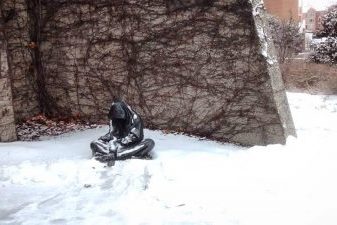“Thus says the Lord:
‘Stand by the roads, and look,
and ask for the ancient paths,
where the good way is,
and walk in it, and find rest for your souls.’”
—Jeremiah 6:16
Deciding how to approach Lent can sometimes prove almost as onerous as actually enduring your resolutions of prayer, fasting, and almsgiving. How do I want to challenge myself? Can I repeat what I did last year? Do I have to involve food? Do I really have to push myself that hard? Can I actually do anything that will show God I love him? How will I best prepare my heart for our Lord’s Resurrection this year?
Last Fall, my first semester at Franciscan, I kept a “Hope Journal” related to a life event of my choosing as a class assignment. With a strong tendency towards pessimism, trying to figure out a topic where I could grow in hope felt like flopping in a wet puddle in the dark. Yes, it was that bad. But I must not have been the only one who felt that way, as without any prompting from the class, my professor knowingly advised us to take our questions to prayer. “Ask God what he wants to give you hope about this semester.”
Suddenly, this became my favorite homework assignment ever. That soggy puddle morphed into a warm, sunny beach—this was all on God. I didn’t have to do anything except open my heart to his goodness and listen. And no matter what my grade turned out to be, the reward would be an increase in hope from God himself. Okay.
Coming back to this initial moment throughout my journaling helped hone my attention to the truth in my professor’s statement—ask God what he wants to do for you. Jesus instructs us to be like children, living in complete dependence on him day after day. A small child depends on his mother and father for food, shelter, warmth, love, and even diaper changes, persistently communicating his needs as best he can (often in fits of tears, mind you) until they are met.
Mid-semester, I attended a conference in Pittsburgh with the Franciscan University Graduate and Non-Traditional (GNT) women’s group, where a priest shared the following lighthearted but true story about his friend:
“One night, after putting my son to bed, he would not stop asking for glasses of water. I brought him water the first time, only to soon hear him asking me again, ‘Dad! I’m thirsty! Can you bring me a glass of water?’ I brought him more water, sat with him as he drank it, and waited until he looked as though he was finally going to fall back asleep. But this continued a third time, even a fourth, and my patience grew thin. ‘You need to go to sleep,’ I told my son. ‘It’s late. If you ask again, I’m going to have to come in here and punish you.’ I returned to my own bed, and nevertheless, five minutes later, his small voice piped up again. ‘Hey, Dad. When you come in here to punish me, can you bring me a glass of water?’”
How many times do we petition God only to become discouraged? But there is something noteworthy about the way a child asks compared to an adult. It’s a question born out of true poverty, an inability to provide for himself, and without even a question of doubt as to whether or not his needs will be met, because his parents’ goodness and generosity are his only concept of reality. As we grow older, we forget that God never ceases to sustain us in this same way, and he not only instructs us to come to him as children, but wants us to do so. Christ died on the cross in loving service to us, to provide for us. Do we allow ourselves to receive his goodness?
By now, I’m sure your Lenten resolutions have been determined, but no matter what types of prayer, fasting, and almsgiving you pursue, remember that Lent is not about what you do, but who God is. His desire is for you to allow him to come to you during these 40 days. For you to rely on him for every need while trusting, as that small child did, that he will bring you drink.
I know. It’s easier said than done sometimes and you’re already trying. That’s why you gave up something in the first place, because you know you really only need God. Yes, but need we be reminded again, it’s not about “giving something up,” but how we allow God to lead us through this process and how we allow God to fill that space.
The desert fathers remind us that penance ceases to be a holy act when the focus becomes the penance itself, rather than God. Reflecting on their teachings in his book Spirit of Penance, Path to God, Dom Hubert van Zeller, O.S.B., stresses:
“It is not the hardness of the work that God wants, but the love that inspires the work. If God wants hardness as well as love, He will arrange for the work to be hard. The first concern from our point of view is to make sure of love. Hardness does not cover a multitude of sins; love does. Hardness is not the bond of perfection; love is.”
Perhaps you noticed one glaring commonality about my questions at the beginning of this blog post: I.
Self-inflicted sacrifices are not where we find the good way—God’s way—or rest for our souls. These questions are not beneficial to ask ourselves. Rather, how does God want to touch me this Lent? How does God want to grow closer to me? And have I asked God to help me let him?
“Come to me, all who labor and are heavy laden, and I will give you rest. Take my yoke upon you, and learn from me; for I am gentle and lowly in heart, and you will find rest for your souls.” —Matthew 11:28-29




